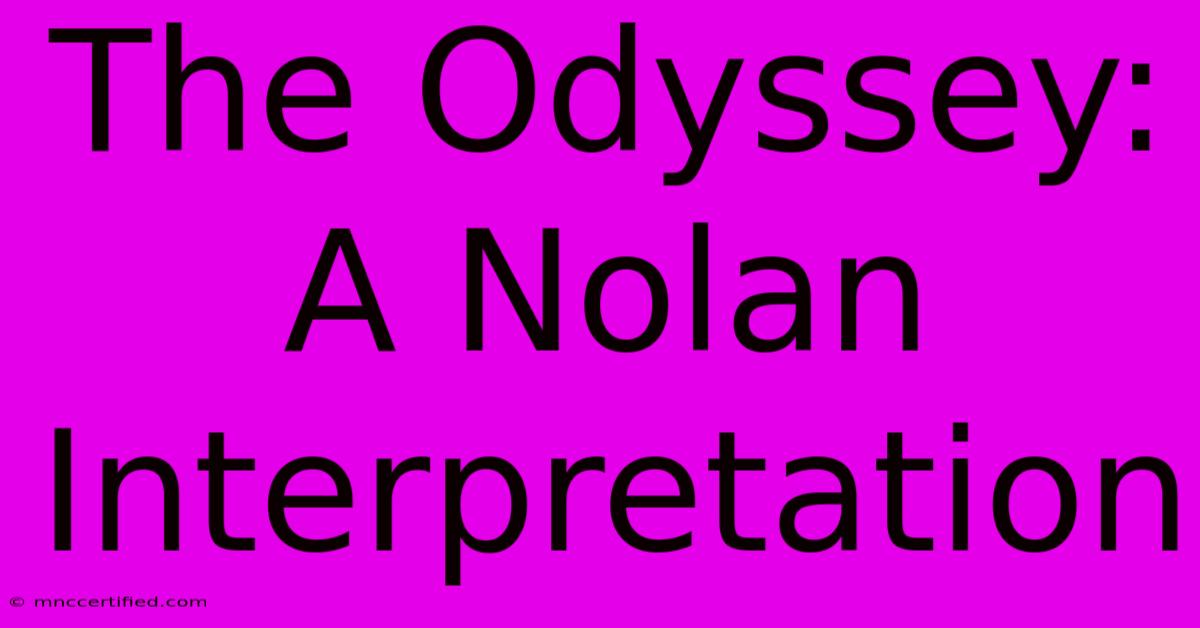The Odyssey: A Nolan Interpretation

Table of Contents
The Odyssey: A Nolan Interpretation – Exploring Themes of Memory, Identity, and Fate
The epic poem The Odyssey, a cornerstone of Western literature, details Odysseus's arduous ten-year journey home after the Trojan War. Its themes of perseverance, loss, and homecoming resonate powerfully. But what if Christopher Nolan, master of mind-bending narratives and fractured timelines, were to reinterpret this classic tale? This article explores a potential Nolanian Odyssey, examining how his signature stylistic choices and thematic preoccupations would reshape Homer's timeless narrative.
A Fractured Homecoming: Non-Linear Storytelling
Nolan's films are renowned for their non-linear storytelling, often employing flashbacks, flashforwards, and dream sequences to unravel complex narratives. An adaptation of The Odyssey through his lens would likely prioritize a fragmented structure. Imagine the film opening with an aged, weary Odysseus, his memory clouded by trauma and years at sea, piecing together his journey through fragmented memories. We wouldn't follow a chronological path; instead, we'd experience the epic through disjointed, visceral sequences. The Cyclops encounter, the Sirens' song, the land of the dead – all presented as fractured memories struggling for coherence. This approach would heighten the sense of disorientation and psychological struggle that Odysseus faces, mirroring Nolan's exploration of subjective experience in Memento and Inception.
The Power of Memory and Deception: Unreliable Narration
Nolan frequently utilizes unreliable narrators, forcing the audience to question the veracity of what they see. In a Nolanian Odyssey, Odysseus's recollections could be unreliable, subtly interwoven with hallucinations and the blurring lines between reality and fantasy. The audience wouldn't passively receive the narrative; instead, they would be active participants, questioning the accuracy of Odysseus's memories and deciphering the truth amidst the fragmented storytelling. This uncertainty could even extend to the actions of other characters, challenging our perception of loyalty and betrayal. The story of the Trojan Horse, for instance, could become a complex study in deception and the fallibility of memory.
Exploring Psychological Depth: The Weight of Trauma
Beyond the fantastical elements, Nolan excels at exploring the psychological toll of trauma. A Nolanian Odyssey would delve deeply into Odysseus's psychological state, showcasing the enduring impact of his experiences: the brutality of war, the loss of comrades, and the constant threat of death. The film would not shy away from depicting the darkness and despair that accompanies such prolonged suffering, showcasing the mental and emotional scars that Odysseus carries. This psychological realism would ground the fantastical elements of the original story, adding a layer of emotional depth often missing from more traditional adaptations.
The Cinematic Spectacle: Practical Effects and Immersive Worlds
While Nolan incorporates CGI, he prioritizes practical effects to achieve realism and visual grandeur. His Odyssey would translate the epic scale of Homer's poem into a visually stunning cinematic experience. Imagine the majestic landscapes, the terrifying sea monsters rendered with stunning practical effects, and the visceral brutality of battles, all created to transport the audience to the world of ancient Greece. This commitment to practical effects would enhance the film's sense of realism and immerse viewers in Odysseus's extraordinary journey.
Fate vs. Free Will: A Nolanian Twist
A core theme in Nolan's work is the struggle between fate and free will. How does this play out in a Nolanian Odyssey? Odysseus's journey could be presented as a predetermined path, dictated by fate and the gods, yet simultaneously showcasing his agency in navigating its challenges. The film could explore the extent to which Odysseus shapes his destiny through his choices, creating a compelling conflict between external forces and internal resilience. This approach would add a layer of philosophical complexity to the narrative, enriching the themes of perseverance and self-discovery.
Conclusion: A Fresh Perspective on an Ancient Tale
A Nolan interpretation of The Odyssey would not be a simple retelling. Instead, it would offer a fresh, psychologically nuanced perspective on this timeless epic, utilizing Nolan's signature stylistic elements to create a thought-provoking and visually stunning cinematic experience. By exploring the complexities of memory, identity, and fate, a Nolanian Odyssey would undoubtedly capture the imaginations of audiences and critics alike, reminding us of the enduring power of this ancient tale.

Thank you for visiting our website wich cover about The Odyssey: A Nolan Interpretation. We hope the information provided has been useful to you. Feel free to contact us if you have any questions or need further assistance. See you next time and dont miss to bookmark.
Featured Posts
-
American Airlines Christmas Eve Outage
Dec 25, 2024
-
Capra Biography Its A Wonderful Life Insights
Dec 25, 2024
-
Sudden Death Of Olympic Athlete Hediger
Dec 25, 2024
-
Unusually Warm Uk Christmas Day
Dec 25, 2024
-
Christmas Eve Day Dining Fort Worth
Dec 25, 2024